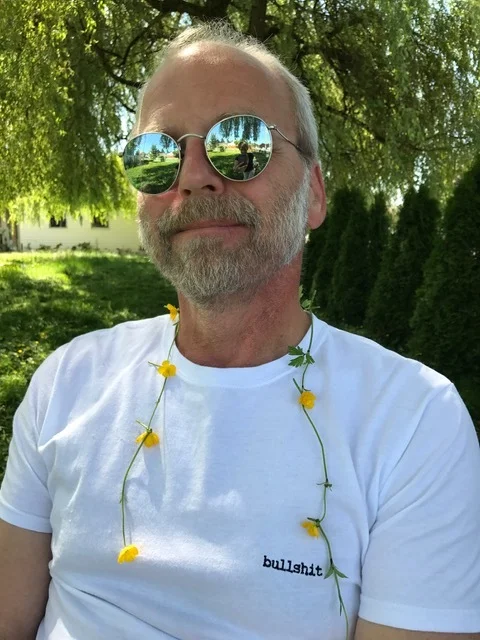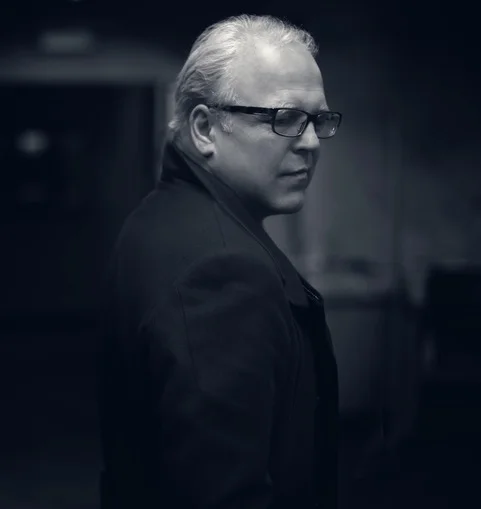Gary Harvey’s before and after
There is a distinct Before in the story of Gary Harvey’s life, as well as an adjacent After.
The dividing line between Before and After was drawn on October 28, 2014, in a Vancouver General Hospital operating room. This is where Harvey underwent a surgery that changed nearly every aspect of his life.
Harvey – a well-respected and well-liked director and producer whose long list of credits includes fan favourite and critically acclaimed television like Madison, Robson Arms, Arctic Air, Cold Squad, and Godiva’s – had been battling tongue cancer for nearly a year, and was less than a week away from surgery, when he received devastating news from his doctor.
The doctor informed Harvey that the tumour had grown across the centre line of his tongue; surgery would now entail removing his entire tongue and voice box. Harvey would need a permanent tracheotomy at the front base of his neck in order to breathe.
Gary Harvey with DOP Bruce Worrall on the set of Arctic Air. Bettina Strauss photo
This conversation took place on Thursday, October 23. Harvey had five days to prepare for the new paradigm.
Harvey quickly contacted his friends and family and said, “If you ever want to talk to me again, this is your last chance” – and they filed through his house, all weekend long, to tell him how they felt about him.
“It felt like a wake,” he says. “At that point, in my mind, my career was over. It was devastating for me.” He wrote a Facebook post detailing his prognosis and later wept with his wife as they read heartfelt words of encouragement from family, friends, acquaintances, and strangers all over the world.
Harvey describes those October days over tea in Kitsilano. More than three years have passed since Harvey’s life broke into two halves: Before the surgery – when he was forced to mourn his life as he knew it (“On Monday morning, I went in for my last examination, and I said, ‘You have to find a way to not let this happen’”) – and After, when he resurfaced in a VGH recovery room and his wife told him that the surgical team had managed to save a small portion of his tongue.
“They saved my life, and they saved my career,” he says. “That little tiny 10 per cent of my tongue has now pushed me forward into where I am today.”
And where Harvey is, is back behind the monitors, directing episodic television for Murdoch Mysteries, the Hallmark Channel, and – coming soon! – the first block of The Bletchley Circle: San Francisco, about an elite team of British and American female codebreakers during World War Two.
Gary Harvey, Before. Dennys Ilic photo
But it’s been a journey to get from there to here, to shift from Before to After. And in the immediate aftermath of his surgery, Harvey thought that directing belonged strictly in the realm of Before.
“I thought, ‘There is no way I can come back from this.’ My speech right now, as difficult as it is for people [to understand], was 10 times worse then,” he says. “I could barely make a sentence properly. My family and friends pulled me through this and showed me the way.”
Those friends include Murdoch Mysteries showrunner Peter Mitchell and Vancouver-based actress-producer Joely Collins, both colleagues from his Madison days. “Peter Mitchell sent me a message a day after my surgery saying, ‘When you’re out, I have your back,’” recalls Harvey.
In early 2015, Collins asked Harvey to direct Coded, her now award-winning web series about students who have been coded by the school system for their severe emotional and cognitive disorders.
“Coded was very important for me, and once I was back on my feet, people started calling me,” says Harvey. “It’s been a comeback in a lot of ways, and a lot of awesome people have stood up on my behalf. So many people came out for me.”
Directing within this new paradigm is different than it was pre-October 28, 2014.
“It’s more fulfilling, and my work has gotten better, because I’m forced to prep harder,” says Harvey. “I can’t depend on this” – he points to his mouth – “to solve problems for me now, so I have to imagine everywhere I want to go first so we’re all on the same page. As a result, I find that my work has gotten stronger overall.” The problem he’s facing now is “when I talk, I have to edit in my head,” he says. “There are phrases and consonants I can’t say. In order to not confuse people, I have to dumb it down a little bit. It’s not nuanced. It’s not finessed. I’ve got to be clear.”
He’s not as busy as he was Before, which isn’t a bad thing – “It used to be non-stop, back-to-back projects, and that was part of what caused [the cancer], I’m sure: my stress level” – and his relationship with success is different: he doesn’t chase it.
Gary Harvey, After. Meghan Black photo
“I came out of this almost as a living cliché because I realized that life is too short,” says Harvey. “It’s a phrase I’ve always recoiled from, because it seems so pat and so average to me somehow. I was a cliché, and I was a living one at one point, but now I’ve embraced it. If I can work on enough shows to support myself, I’m happy with not working myself sick.” He still enjoys the process of directing, but he doesn’t sweat the small stuff; he’s able to let go.
“I will always have passion for the process,” he adds. “But I don’t find myself pacing as much anymore. I’m more comfortable with myself. In many ways, my life has gotten so much better.”
Harvey’s journey of the last three years is evident in his artwork, which he shares via a dedicated Instagram feed.
His artwork – wherein he zooms in and manipulates minute aspects of his own photography to reveal something vibrant, dazzling, and regularly otherworldly – is symbolic of his own shift in perspective.
“What’s happened recently is I’ve been forced to zoom in on myself as close as I possibly can,” he says, noting that this realization was a recent one. “I had never made the connection until a couple of days ago; ‘Oh my god, this is what I’m doing with my life!’” He’s planning a gallery show for May.
“I amplify life now,” says Harvey. “What that means is I try to fill my head with the things that I want in my life, and by doing that, I don’t have all of that other bullshit. I pursue what makes me happy. I’m amplifying joy.”
Above the 60th. Artwork by Gary Harvey
Untitled. Artwork by Gary Harvey












